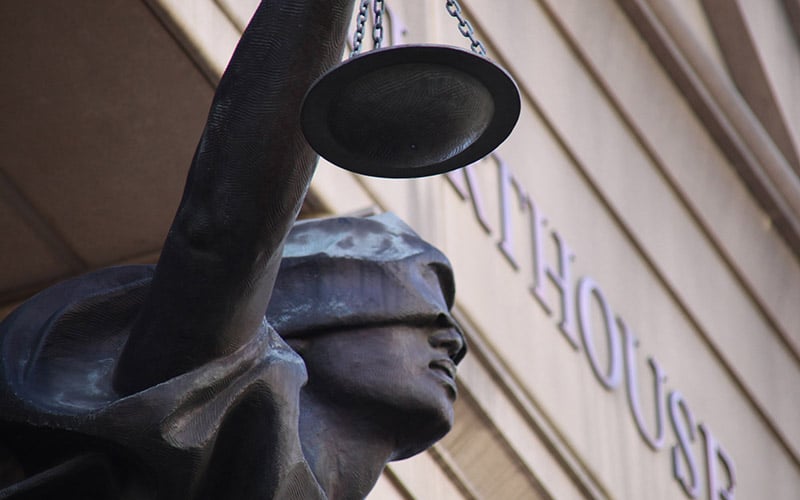
A federal appeals court said restrictions on politicking and fundraising by would-be judges are needed to protect the public’s confidence in a court system that bases rulings on the law and not on party politics. (Photo by Tim Evanston via flickr/Creative Commons)
WASHINGTON – A federal appeals court Wednesday upheld Arizona’s prohibitions on campaigning and fundraising by judicial candidates, saying the rules are necessary to protect “the public’s confidence that judges base rulings on law, and not on party politics.”
The decision by the full 9th U.S. Circuit Court of Appeals rejected arguments by Randolph Wolfson, a state judicial candidate in 2006 and 2008, who claimed the rules violated his free speech rights.
“The state reasonably wants to uphold the public’s perception of publicly elected judges as being fair-minded and unbiased,” which justifies the restrictions, said the opinion written by Judge Ronald M. Gould.
Wolfson declined to comment Wednesday, saying he had not had a chance to read the opinion. His attorneys were not immediately available for comment.
A spokeswoman for the Arizona Attorney General’s Office said the office would not comment on the ruling, which she said in an email speaks for itself.
This was the third time the circuit court has considered Wolfson’s case, which was originally filed in 2008.
Arizona’s Code of Judicial Conduct prohibits judicial candidates from “personally soliciting or accepting” campaign contributions, although they can accept money from a campaign committee.
The rules also ban judicial candidates from endorsing, making speeches for or soliciting funds for political organizations or candidates for any public office. Finally, they cannot “actively take part in any political campaign” other than their own.
Wolfson said those retrictions – the personal solicitation clause, the endorsement clauses and the campaign prohibition – were not narrowly tailored enough to justify the encroachment on his First Amendment rights.
But a U.S. District Court has twice rejected his claims. In the latest appeal, Wolfson argued that the lower court misinterpreted a U.S. Supreme Court case, Williams-Yulee v. Florida Bar, which upheld similar politicking limits on judicial candidates in Florida.
Wolfson argued that Arizona’s interest in judicial campaign financing was “significantly different” than Florida’s, citing both states’ judicial conduct codes.
The circuit court agreed that the lower court applied the wrong level of scrutiny from the Florida case – but said the outcome was still correct.
“Arizona has a compelling interest in upholding public confidence in the judiciary. And in light of Williams-Yulee, we hold that Arizona’s Rules are narrowly tailored to its compelling interest,” Gould’s opinion said.
He called Wolfson’s focus on the difference in Florida’s language – which calls for public confidence that judges act without “fear or favor” – and Arizona’s, which cites public perception of “the judge’s honesty, impartiality, temperament or fitness” – a “distinction without a material difference.”
“There are no magic words required for a state to invoke an interest in preserving public confidence in the integrity of the state’s sitting judges,” the court said.
The ruling also rejected Wolfson’s argument that there are less restrictive ways to achieve the same ends, by having judges recuse themselves from cases where there is a potential political conflict, for example. The court said that could cripple smaller courts or create an incentive to contribute to a judge in hopes of later forcing that judge off a case.
In a concurring opinion, Judge Marsha S. Berzon said the “societal interest” in maintaining an independent judiciary outweighed any challenge to the compelling interest argument against the endorsement and campaigning bans.
“The campaign and endorsement restrictions respond to a structural need – they restrict judges from engaging in nonjudicial campaigns, to prevent them from being entangled in the legislative and executive political process,” Berzon wrote.
Berzon also defended the application of the rules to both sitting judges and challengers, saying that applying it only to incumbent judges would put them on “somewhat uneven footing.”